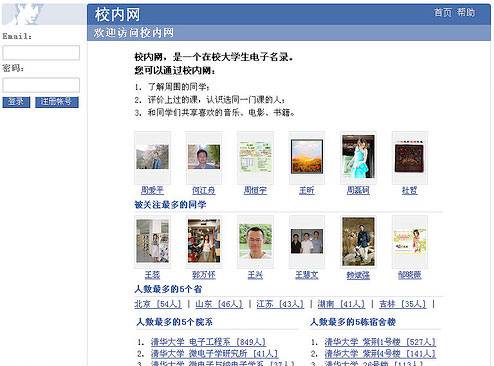The leading social networking site in China, renren.com, started out as a blatant Facebook clone – but it now has tens of millions of users. Despite obvious similarities to Facebook, there is one significant difference from the U.S. in how Renren and other Chinese SNS are used. The bread and butter of these sites is social games using virtual items. Indeed, Farmville originated in China!

In this first post of a series, we outline the most popular social network sites in China. In follow-up posts, we’ll look at Twitter clones, online video, and censorship. This series is based on a discussion I had with Kaiser Kuo, a Beijing-based expert on China’s Internet.
Kaiser Kuo is a Chinese-American who lives in Beijing. He currently works for one of China’s leading online video services, Youku.com, as a consultant on International Business. Previously he was Group Director, Digital Strategy at Ogilvy & Mather China.
There are 3 social networking sites that are clearly in the lead in China, according to Kaiser Kuo.
Renren.com is the leading social network. It began as a Facebook clone called Xiaonei.com – which means ‘on campus’ in Chinese. In August 2009 it changed its name to Renren, which means ‘everybody.’ Renren had 70 million registered users at that point. The site is owned by Oak Pacific Interactive and has had over $400M pumped into it by investors Softbank.

The site was founded in December 2005, shortly after Facebook began to ramp up. Its founder Wang Xing later founded Fanfou, a popular Twitter clone (see our next post in this series).
Xiaonei.com was literally a Facebook clone when it started, sporting the same shade of blue and the same layout. ReadWriteWeb guest writer Gang Lu wrote on this blog in June 2008 that Xiaonei.com “was like a simplified version of Facebook in Chinese when it was first launched.” He noted that it had “the same layout, same color scheme and even a very similar logo,” which he said “made people wonder if there was an official connection with Facebook.”

Kaixin001.com is another very popular social network. Kaiser said that its users are mostly “white collar middle class” and typically come from a “first tier city.”
Kaiser noted that Kaixin001.com is extremely popular among people who work for multinational companies, ad agencies and other white collar companies. Accordingly, the site is valuable because of its relatively wealthy user base.

The third social network that is very popular in China is 51.com, which Kaiser said is mostly used by people who live in “lower tier cities” and even rural areas. He noted that it has a “lower brow offering.”

Each of these three hugely popular social networks in China has its own niche; from the mainstream Renren, to the more prestigious Kaixin001, to the populist 51.com.
In our next post in this series, we check out China’s Twitter clones.





















